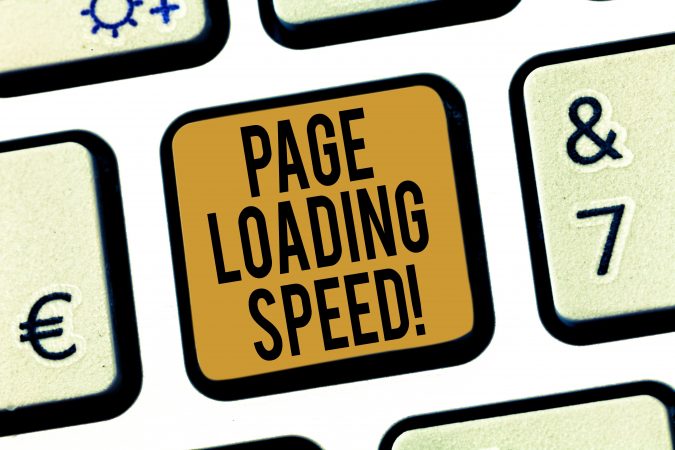How Page Speed Affects Your Website SEO & Rankings On Google
Website loading speed is very crucial for SEO and, consequently, the site’s ranking on Google. E-Commerce companies need to pay much focus on this because Google page speed is one of the most important ranking factors. The matter has become a serious concern that Google took measures to improve loading speed and nudge website operators to optimize their web speed. This adds another reason to look for a better option for your web hosting, learn about image compression, better optimize your site and much more.
Website speed affects SEO. That fact took full effect after Google made changes to its Algorithm Speed Update in July 2018. That included website speed for both desktop and mobile phone search engine result pages. Internet experts continued to lobby for fast, mobile-optimized websites, and Google was compelled to oblige to use speed as a standard ranking factor for mobile searches as well. So even if you’re running a site that primarily focuses on mobile users – speed is going to be essential.

What is Page Speed?
Most people can barely differentiate between page speed and site speed. The former is the time taken for the content of a page to appear on the UI of a browser after a search. On the other hand, website speed is the period in which the bundle of pages on a site loads.
Also referred to “time to first byte” (the time it takes web servers to generate the first byte of information to the browser), page speed profoundly influences user experience, because no person wants to waste time waiting for a page to load. Low speeds lead to higher bounce rates and negatively impact your PageRank. And of course, it all has a long chain reaction – you rank further down, you get fewer visitors, they bounce again, you go further down, lose sales, etc.
Google released the Google Lighthouse, a PageSpeed Insights tool that assesses the technical aspects of your website to determine its load time. Additionally, it examines the quality of user experience and ease of accessibility.
Once you feed the website your URL, the tool runs a quick sweep-through while having different factors in mind that affect page performance. At the top of the screen, the general score will appear, indicating an average number based on multiple tenets. Further down, the other details about the real stuff that affects the load time will appear.
Another way you can ensure that your website always excels in up-time is to partner with a reputable web hosting company, that’s going to definitely improve your chances of better page speed. You can work on your site knowing that everything is relying on how it’s built, and not on server issues that are out of your control.
You can imagine the financial damages that low page speed can do your online business. Most hosting firms claim to offer 100% up-time, but only a handful can be reliable enough to offer 99.99% up-time. Therefore, you should be careful when weighing your options for web hosting. We can discuss our web hosting features and reliability to answer all your questions.

How Does Your Website Win from Excellent Page Speeds?
Let’s cover the most important benefits your site will get if you improve page speeds:
1. Enhanced User Experience
The reason why many online businesses engage in page speed optimizing pursuits is to improve user experience. People will still abandon a web page that takes several seconds to load. While you may use videos and pictures to boost engagement, it takes a fast load time even to retain your audience. If your page takes more than seven seconds to load, the user becomes frustrated with waiting. Statistically, 80% of visitors will bounce off a page if it fails to load in three seconds. A quick response is required for desktop and mobile users to freely navigate the page and browse through the content.
According to Google, a delay of one second has detrimental effects on your organic traffic volume. In fact, consumer satisfaction dives by 16%. Furthermore, 79% of them will express reluctance to purchase the products and services you offer.

2. Higher SEO Ranking
An impressive load time avails most of your landing pages for Google spiders and crawlers to index. That means that a significant number of your web pages will rank higher.
Let’s try to understand how that works. Google has set a bandwidth that regulates the time takes by the crawlers on your site. With a longer loading time, the bandwidth shortens, and that leaves a shortlist of pages for the Google crawlers.
That brings benefits in two folds. When the load time is fast, Google crawls and indexes more of your pages. Consequently, the pages achieve a high ranking. When people query Google and your page appears on the first ten positions, they will likely click on one of yours. Google will be doing much of the work for you at this juncture, because optimized pages will retain your target audience and, possibly, they may consider purchasing from you.
3. Attainable Marketing Goals
Statistics indicate that 67% of online buyers may decline to spend more time on your site because of slow page speed. On the contrary, shortening the load time by one second is enough to boost your conversion rate, with a spike of between 10%-20%.
Wrapping Up
Proper page optimizations contract loading time, and that gives you an edge when it comes to online marketing. You’ll record higher sales and rate of conversion. Other benefits include a reduced bounce rate and improved consumer services. If you look at all these metrics, it is evident that a fast-loading page has one bottom line: increased revenue

Mary is a passionate blogger and the chief editor at her own content marketing company PRable.com. Since college, she’s been interested in break-through technology and technical writing about innovative products and services that change our everyday lives for the better. She’s also interested in web design and photography.
